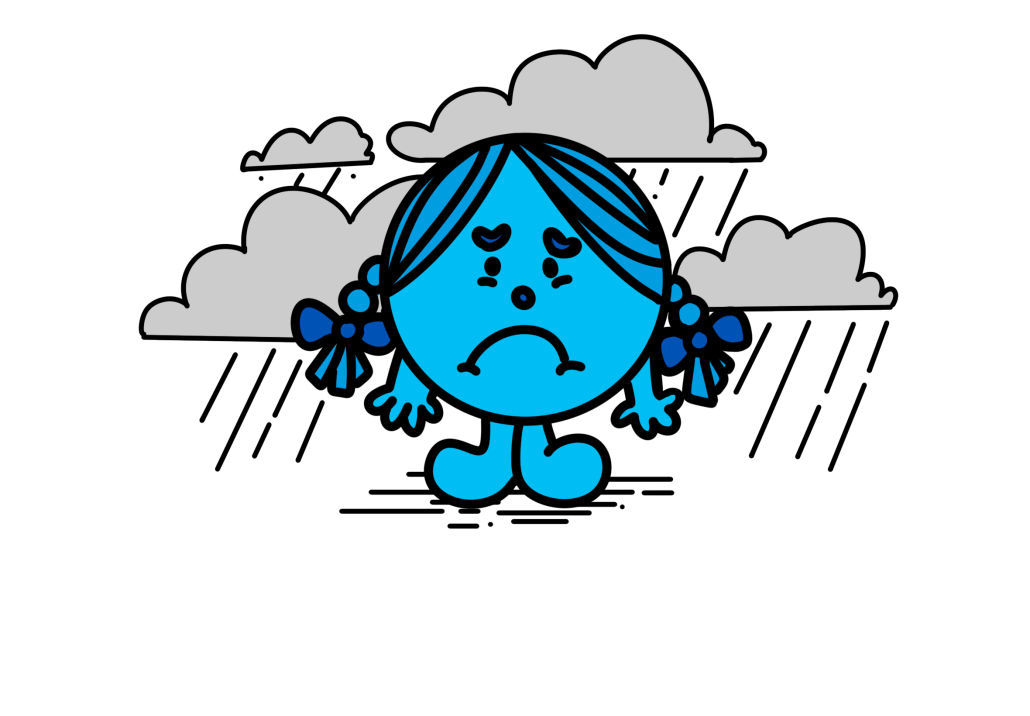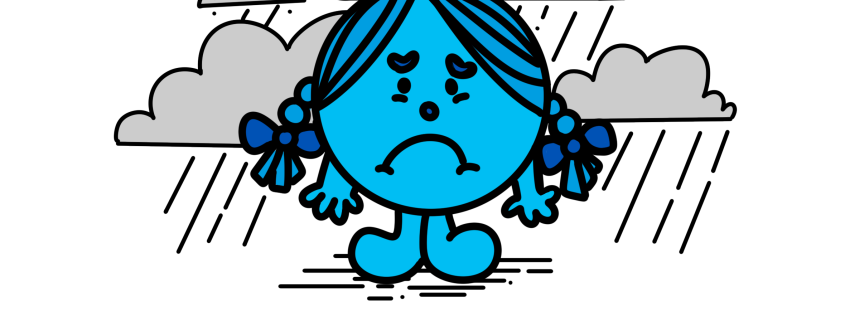Chronically Catherine: Little Miss Grief

Content warning: This article contains references to death and addiction.
Remember those “Little Miss” kids books by Roger Hargreaves? Like “Little Miss Sunshine,” “Little Miss Bad” or “Little Miss Trouble”? Well, I think Hargreaves missed one: Little Miss Grief.
For reference, I’ve always identified with Little Miss Sunshine — a chaotic, giggling yellow blob, laughing my way through the good and the bad. When my health collapsed at 20 years old, I was sure that a few doctor visits, some pills, an infusion and some outpatient surgery were all I needed. I had to miss a semester of college, but so what? I could handle a temporary withdrawal easily, then go back to my old self. But as weeks turned into months and months turned into semesters, my life transformed. My health started taking things away from me, like my ability to fight infections, attend college, walk up the stairs unassisted or shower without a chair. I began to feel storm clouds roll in over my sunshine.
Suddenly I was faced with impossible questions. What do you mean I may never be well enough to return to college? How am I supposed to live with the fact that I may be this unwell for the rest of my life? Why was it so hard to get out of bed all of a sudden? What was this feeling?
It wasn’t sadness, it was a deeper and more perpetual ache that I couldn’t shake and couldn’t name.
As my health spiraled, I felt like I lost control of my body and any certainty of how each day would go. I lost the ability to make and keep plans, make food for myself, travel, swim, run, jump, dance, hike or backpack. I also lost control of my ability to look on the bright side and to feel at peace. I knew I was experiencing loss, but I was confused — no one had died. I was still alive, breathing and loved, so why was my chest so heavy with this feeling of loss?
But I remember when it finally clicked.
My best friend from high school, whose dad lost his life to addiction, shared with me over a FaceTime call during the coronavirus pandemic how she was still struggling with his loss so many years later. She explained how her life was never the same, how her mourning interrupted her day at random times, how she lost friends who didn’t know how to support someone coping with such devastation, how her grieving and healing had been anything but linear.
So much of what my best friend described was how I felt about life post-diagnosis. Her vulnerability during that call, and education over the many years of our friendship, allowed me to put into words for the first time a feeling I’d been experiencing since becoming chronically ill, but never knew how to express: grief.
I didn’t know if I was allowed to identify with grief because my experience felt different. For me, it was “living grief,” which I define as a paradoxical experience of looking in the mirror, seeing my body look the same as it did pre-diagnosis (especially if my port is covered) and feeling perplexed that what’s causing me grief is reflected back at me. I can touch my grief because my grief is my body, which is a real fucking trip. And for so many others it is, too.
At one point in the book, Little Miss Sunshine asks the King of Miseryland — where laughing, smiling and giggling were forbidden — “But why are these things not allowed?” I have the same question: Why does it feel like expression or discussion of chronic illness or disabled grief isn’t allowed? Especially for young people?
I think it’s because for much of my life, grief was an “over there” emotion, the biggest of them all, one everyone hopes they never have to deal with. And if you have to deal with it at an early age, everyone is scared to talk to you about it. A misunderstood, underrepresented and stigmatized feeling, chronic illness grief, for me, has always been this reserved emotion. Especially because doctors don’t know how to address grief in young patients because we are supposed to be the “Little Miss Next Generation of Sunshine.” I think that’s why I felt so alone and confused by this emotion.
Simultaneously, I can’t tell you the number of times I’ve cried to my mom, curled up in her arms asking, “Why did this have to happen to me?” Mumbling through snot and crying, “I wish I could sing, dance, run, play volleyball again. I wish I could do what I used to. I wish I had my old body, the one that worked better. It feels like that part of me has died.” And to be honest, parts of me have.
There were certain freedoms I used to have as an able-bodied person that I mourned when I lost. But there are also parts of me that died that I’m kind of glad passed away.
I’m glad my sense of people-pleasing died when I got sick because I no longer had the energy to please others. Today, I only have people in my life who genuinely care and love me. I’m glad my need to organize everything down to every detail died because my health is uncertain, and now I embrace uncertainty and can laugh when things go unexpectedly. I’m glad my filter died when I got sick because now I say what I think unabashedly and with courage, I speak truth to power because I’ve been told I probably won’t live as long as I thought I would, so fuck it!
With grief I used to think there was a before and after, that it was binary. And unfortunately, that is partly true. It happens, and then there’s after. But now I know, because of how heroically my friend has shared her grief with me, that grief comes in all shapes, sizes and durations. It ebbs and flows. It’s how we make meaning of our grief that defines the after. In my case, it’s taken the shape of writing this column.
So yes, sometimes I need to be Little Miss Grief. I need to validate my pain. But eventually I laugh again, exercise it out, talk to my therapist, listen to music or have a sob sesh. With time, I’ve found a way not to let grief be the center of my universe. Slowly, it becomes just another planet in the orbit of my complex lived experience, along with joy, family, friends, purpose, pain, chaos, love and of course, fabulosity.
Writer’s note: Feel free to reach out to Chronically Catherine if you’re also a student with a disability working to coexist with daily adversity without losing sight of your fabulosity — [email protected] or @itschronicallycatherine on Instagram.
Catherine Ames is a newly graduated senior writing about life as a young person coexisting with chronic illness in her column, “Chronically Catherine.”

